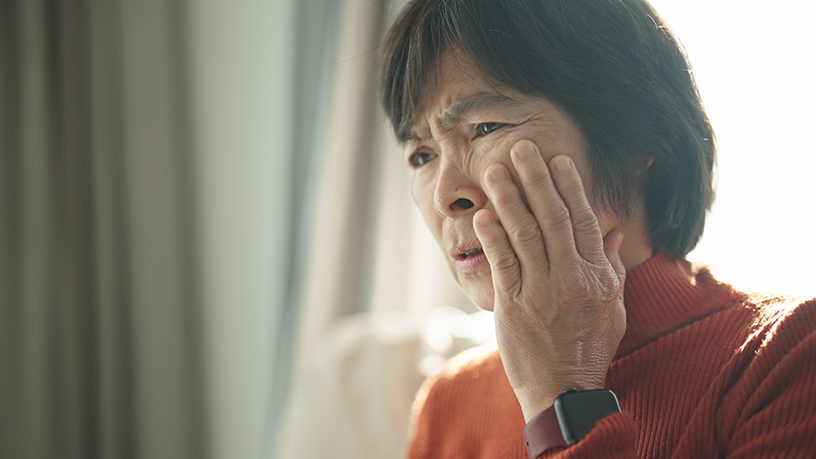Bruxism is a disorder that causes you to clench or grind your teeth. Find out how it can impact your sleep and even lead to other sleep conditions.
On this page
Key takeaways
Common signs of bruxism range from cracked teeth to jaw pain.
Sleep is important for maintaining healthy teeth. Discover ways to get both your nightly routine and dental hygiene back on track.
If you have trouble sleeping, you might be surprised to learn that your teeth may be to blame.
Bruxism is a condition that causes someone to unconsciously clench or grind their teeth, usually at night. It’s a sleep-related movement disorder that can damage your teeth and put you at a higher risk of other sleep conditions.
How does bruxism impact sleep?
According to Bupa Head Dentist Dr Cathryn Madden, bruxism "can happen whilst awake or asleep, with people who are affected by the latter often not aware of the habit”.
Sleep-related bruxism tends to lead to poor quality or disturbed sleep. The condition typically occurs in the early stages of sleep in several cycles, causing people to repeatedly wake up before they enter deep sleep.1
Bruxism can also lead to other sleep conditions, such as snoring and sleep apnoea.2
As people are often unaware of their bruxism, a visit to the dentist is usually the best way to detect the issue. They can identify signs of bruxism, such as:
- cracked or chipped tooth enamel
- worn down teeth
- broken teeth or restorations (like fillings)
- jaw pain or strain
- sensitive teeth.3
Why is sleep important for healthy teeth?
“Those who suffer with sleep apnoea or snore are more likely to sleep with their mouth open, which reduces saliva flow and makes the mouth more prone to opportunistic bacteria,” says Dr Madden.
Saliva helps protect teeth and gums by neutralising harmful bacteria that can lead to tooth decay and gum disease.
A good night’s sleep can also help strengthen tooth enamel via essential nutrients like calcium and phosphate.4
Moreover, research has identified that poor sleep quality can affect the appearance of facial features, formation of oral structures and development of oral disease.5
How to maintain quality sleep and oral health
Good dental health contributes to your overall wellbeing.6 And establishing a daily dental routine is the first, all-important step for healthy teeth and gums.
“Maintaining oral health is simple to do by brushing twice daily with a fluoridated toothpaste, flossing daily and maintaining a balanced healthy diet which is low in sugar,” says Dr Madden.
“Stress management therapy, relaxation techniques [and] regular exercise have all been shown to promote better quality sleep,” she adds.
It’s also important to address any associated sleep problems. A dental professional can recommend a mouthguard or occlusal splint to reduce stress and wear on your teeth and jaw muscles.
To promote quality sleep, you might also:
- decrease screen time before bed
- establish a routine sleep and wake time
- have good ventilation in your bedroom
- use comfortable bed sheets
- reduce your alcohol and caffeine consumption.
Find your nearest Bupa Dental Clinic

At Bupa, trust is everything
Our health and wellbeing information is regularly reviewed and maintained by a team of healthcare experts, to ensure its relevancy and accuracy. Everyone's health journey is unique and health outcomes vary from person to person.
This content is not a replacement for personalised and specific medical, healthcare, or other professional advice. If you have concerns about your health, see your doctor or other health professional.
1Yap, A. U., & Chua, A. P. (2016). Sleep bruxism: Current knowledge and contemporary management. Journal of conservative dentistry, 19(5), 383-389.
2Healthdirect. (2023). Teeth grinding (bruxism). Healthdirect.
3Better Health Channel. (2020). Teeth grinding. Victoria State Government, Department of Health.
4Kurtović, A., Talapko, J., Bekić, S., & Škrlec, I. (2023). The Relationship between Sleep, Chronotype, and Dental Caries-A Narrative Review. Clocks & sleep, 5(2), 295-312.
5Schroeder, K., & Gurenlian, J. R. (2019). Recognizing Poor Sleep Quality Factors During Oral Health Evaluations. Clinical medicine & research, 17(1-2), 20-28.
6Australian Government, Australian Institute of Health and Welfare (2023). Oral health and dental care in Australia. Australian Government.
You might also like
What is bruxism?
Involuntary teeth grinding or clenching is known as bruxism. Find out if it’s affecting you.
What is temporomandibular joint dysfunction (TMJ)?
Problems with your jaw can be painful. We look at the common causes and symptoms of temporomandibular dysfunction, better known as TMJ.
Home teeth whitening: Is it safe?
Home teeth whitening kits might seem like a great idea, but they aren’t always what they’re cracked up to be. Discover whether they’re safe or effective.
The importance of oral hygiene
Bupa dentist Dr Malcolm Duff explains why looking after your teeth and gums should be an important part of your daily routine.





